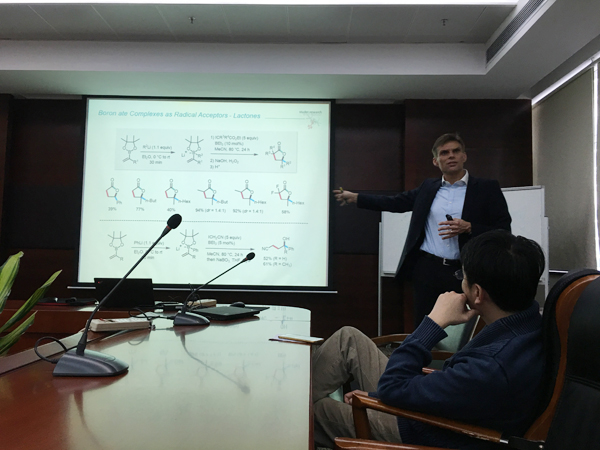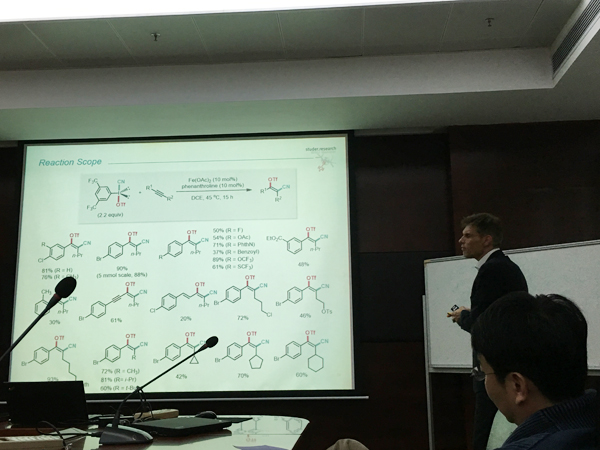On November 24, 2017, with the invitation of Prof. Yong Huang, Prof. Armido Studer from WWU Münster, Germany, visited our school and delivered a wonderful lecture entitled “Electron catalysis” in F101.
Firstly, Prof. Studer introduced the concept of using the electron as a catalyst, which can be compared to addition or removal of a proton — that is, acid/base catalysis. Moreover, conceptualizing this term, electron catalysis, is also aiming to modernize and simplify concepts of redox catalysis of radical and radical ion chain reactions in the setting of organic synthesis.
Whereafter, Prof. Studer showed a series of cascade reactions, which developed by their lab, to demonstrate how the electron can serve as catalyst to create a setting where radicals and radical ions are smoothly generated, reacted and removed with great selectivity. Diverse radical cascades, including direct arene trifluoromethylations, base-promoted homolytic aromatic substitutions (BHAS), radical Heck-type reactions, and radical cross-dehydrogenative couplings (CDC), can all be viewed as electron-catalysed reactions.
After the speech, professors and students of our school discussed with Prof. Clark actively on issues such as “radical intermediate resulted super acid”, “plasma promoted radical cascade” and etc. This lecture featured with great novelty and sufficient content, brought us a big inspiration on our research in synthetic chemistry.(Written by Xinhang Jiang;Photoed by Jiean Chen)


Brief introduction of speaker:
Education:
Studies ETH Zürich (1987-1992);
Ph. D. ETH Zürich (1995, Supervisor: Prof. D. Seebach, asymmetric synthesis);
Postdoc Pittsburgh Univ. (1995-1996, Supervisor: Prof. D. P. Curran, fluorous chemistry);
Professional associations:
Habilitation ETH Zürich (1996-2000, radical chemistry);
Associate Prof. Marburg Univ. (2000-2004, radical chemistry in synthesis and in materials science);
Full Prof. Münster Univ. (2004-present, radical chemistry, surface chemistry, catalysis).
Current research interests:
The fundamental understanding and exploitation of radical processes play a key role in the research of the Studer group at the WWU Münster. The program is devoted to the fields of catalysis, organic synthesis, and materials science. Detailed mechanistic investigations play an important role for method development in organic synthesis and beyond. General concepts such as the "persistent radical effect" (PRE) as an early example and the role of the "electron as a catalyst" more recently are explored. Applications of nitroxide radicals remain fundamental in the research activities of the Studer laboratory, leading to applications in various fields such as surface chemistry, bioconjugates and natural product synthesis.